Martin Edwards's Blog, page 26
May 3, 2024
Forgotten Book - The Madman Theory
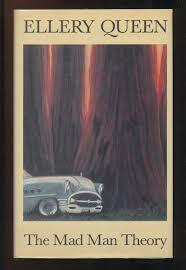 The Madman Theory is an Ellery Queen novel. Except that it doesn't feature Ellery Queen the character and it wasn't written by Ellery Queen, the pseudonymous writing duo. Published in 1966, the book was ghost-written by Jack Vance, a highly-regarded science fiction writer who wrote two other 'Ellery Queen' novels.
The Madman Theory is an Ellery Queen novel. Except that it doesn't feature Ellery Queen the character and it wasn't written by Ellery Queen, the pseudonymous writing duo. Published in 1966, the book was ghost-written by Jack Vance, a highly-regarded science fiction writer who wrote two other 'Ellery Queen' novels. The book opens with a cop, the likeable Omar Collins, heading into the wilds to look at a crime scene. A wealthy businessman, Earl Genneman, has apparently been shot dead by a sniper while on a trip with four close associates. The location is remote - the middle of nowhere, really - and one of the puzzles is why it was chosen for the killing. Another mystery is why Genneman was killed - he had relatively few enemies. We then have a flashback scene which shows Genneman and the others starting out on their trip, which was so dramatically interrupted. After that we have, in effect, a police procedural as Collins meticulously pursues the killer.
At first the crime seems so outlandish that it must be the work of a madman (hence the title of the book). Collins tracks down the cars which may have brought the killer to the area, and before long his inquiry focuses on a man called Steve Ricks. When Ricks too is brutally murdered, it seems clear that the two crimes are linked.
I enjoyed the taut style of writing and the mystery kept me entertained. It's a short book and a quick read. However, there are two weaknesses. There isn't any adequate foreshadowing of the motive for the crime, which irritated me a lot. And the means by which the crime was actually committed was a bit far-fetched. So not a masterpiece, but I enjoyed it nevertheless.
April 30, 2024
The Wild Atlantic Way

I'm back in England after a short holiday on the west coast of Ireland, somewhere I've not visited since a great trip more than thirty years ago. I've spent the winter writing busily and felt in need of a break in order to freshen up my imagination, so a short package tour featuring 'the Wild Atlantic Way' was something of an impulse buy. I expected to get drenched most of the time, but in fact, we dropped lucky and the weather was unexpectedly fantastic, a real bonus.




Our base was a very good hotel in Claremorris which did an excellent Irish breakfast, in which I duly indulged, and the trips each day were varied and fascinating. I discovered wonderful places I'd never even heard of before, including the Cliffs of Moher, the Burren, Cong, and Kylemore Abbey (top photo), as well as watching a leading sheepdog trainer in action - not something I expected to be as interesting as it proved to be. There was a boat trip along Ireland's only fiord, Killary, and a day in the pleasant city of Galway. We also had a short visit to the shrine at Knock, the scale of which took me aback.
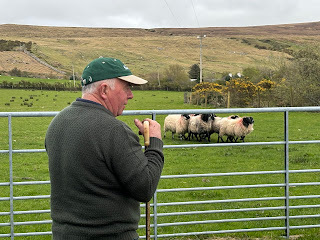
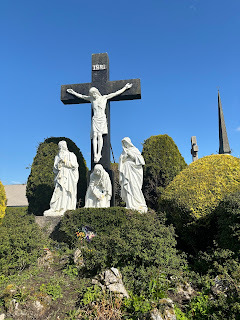



I've never set a story in Ireland, although I've had quite a few Irish characters in my books. Although no fresh story ideas came to me during the trip, it was inspirational in another way, in that - freed from the keyboard - I was able to let my mind roam around the novel I started working on recently, and this was really beneficial. I came back with batteries duly recharged.


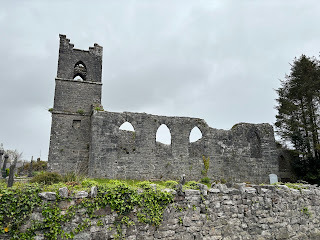
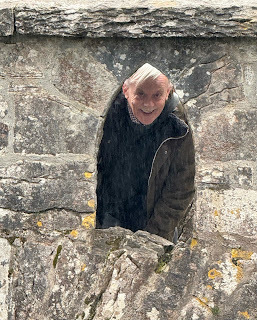

On returning, I was sorry to learn of the death of a fellow solicitor and crime writer, C.J. Sansom. I never met him, but he was clearly an interesting individual as well as a good writer who had mixed fortunes over the years. An inheritance enabled him to take up full-time writing and his sales meant he could afford to make a huge donation to the anti-Scottish independence campaign, but he wrote poignantly about his experience of depression over the years. I was tempted to feature him more extensively in The Life of Crime, but I didn't want to intrude on his privacy.
He was due to be presented with the Diamond Dagger on the same evening as me (my actual award two years earlier had to be online because of the pandemic) but sadly his illness - he'd suffered from cancer from over a decade - prevented this, and instead he joined us online. He was clearly a private man, so he might not have welcomed much fuss anyway, but I did feel sorry that he wasn't able to take part in that great moment, really the highlight of his career, directly. But the tributes were warm and tonight, by a strange coincidence, sees the start of the television version of his Shardlake books.
April 29, 2024
Lloyd and Hill - 2001 ITV review

Jill McGown must have been hugely, and deservedly, excited, when ITV filmed her novel A Shred of Evidence as a pilot for a new series called Lloyd and Hill, starring Philip Glenister (prior to his triumphant portrayal of Gene Hunt in Life on Mars) and Michelle Collins, who was already a soap opera star, thanks to Eastenders. The cast also included Hywel Bennett, a terrific actor, in a cameo role as a grumpy pathologist which had quite a bit of potential.
Richard Maher, the screenwriter, had plenty of experience, with credits including Taggart and Pie in the Sky. He chose not to start with the first novel in the series, A Perfect Match, but rather to refashion a book that appeared twelve years later, thus refashioning things. The story has Judy Hill reuniting with Lloyd after years apart. A flame still burns between them; he has got divorced in the meantime, while she has got married.
The story involves the murder of a 15 year old schoolgirl. One of her teachers is the prime suspect and his behaviour seems incriminating. But of course, there is more to it than that. The plot is, as usual with McGown, neatly contrived, making maximum use of a limited pool of suspects. The rekindled spark between Lloyd and Hill creates a sort of cliffhanger ending. But regrettably, there were no more shows.
Apparently, this was because the audience figure were so-so and critical reception poor. I suspect there was some prejudice against Michelle Collins because of her soap opera background, but actually she gives a perfectly capable performance. Twenty three years on, some of the attitudes (especially regarding sexual relations with minors) seem inappropriate, but the chemistry between Glenister and Collins would have made the series worth persisting with. The geographical setting of the story is left vague, and this may have been a mistake (compare and contrast the TV treatment of similar police series by Ann Cleeves, in which setting is crucial). Disappointing for the author, but at least she did get her work on the telly! And the books definitely remain worth reading.
April 26, 2024
Forgotten Book - Little Brother Fate
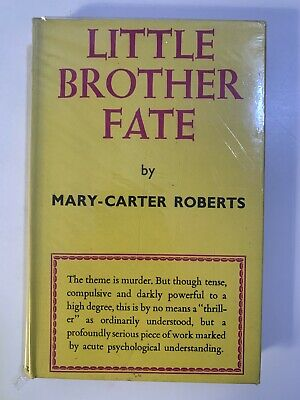
A while ago, in one of those bookshops that have sprung up at so many National Trust properties, I came across a green Penguin paperback with which I was unfamiliar. This was Little Brother Fate. Nor was I familiar with the author, Mary-Carter Roberts. The paperback was published in 1961 and the first UK edition (under the Gollancz imprint - see the cover image above, taken from the internet) three years earlier, and four years after the book first appeared in the US.
Roberts was a prominent American journalist, a former book editor for the Washington Star, and she'd previously published one mainstream novel. She was born in 1899 and she died in 1979, but after Little Brother Fate, she never published another novel, whether in the crime genre or otherwise. So this title ranks as a crime 'singleton'. But I found it interesting and after a slowish start it warmed up nicely.
The novel tells the story of three murder cases, which are interwoven together so as to give us a degree of understanding of the psychological origins of the crimes in question. Each of the three cases is very clearly based on a famous real life American case which involved more than one 'bad actor': the Snyder-Gray case, the Hall-Mills case, and the Leopold and Loeb case. In one of the three real life cases, nobody was ever convicted of the crime.
Roberts builds the tension steadily as we follow a group of doomed characters along the road to their ultimate fate. She does make some changes to the facts of the real life cases, but her journalistic skills are as evident as her limitations as a novelist. She tends to tell rather than show, and really the three interlinked stories are reportage. So I'm not unduly surprised that she didn't write another crime novel. But I can't recall any other book that is quite like this one and I found it interesting and readable. It has sunk into obscurity, but in my view undeservedly.
April 24, 2024
The Alphabet Murders - 1965 film review

One of the very first crime novels I ever read was Agatha Christie's The ABC Murders. I absolutely loved the story. It was my grandmother's copy and I remember discussing the plot twists with her as I kept reading. That paperback edition was a movie tie-in, with cover images taken from the film of the book, The Alphabet Murders. I was intrigued, but I never saw the film. I learned that it was a flop and few people had a good word to say about it. Agatha Christie herself hated it. But I decided I'd like to judge it for myself, and now at last I've seen it.
And my verdict is that, unfortunately, the panning that the movie received was well-deserved. There have been some dreadful adaptations of Agatha over the years, but this still ranks as among the worst. The problem begins with the casting of Tony Randall as Poirot - suffice to say that he's no David Suchet. He's not even a Ustinov or a Malkovich.
The script is dismal. The writers, David Pursall and Jack Seddon, were responsible for Murder Most Foul, the film that introduced me to Agatha in the first place, so I have kindly feelings towards them, but really this isn't a great piece of writing. The director, Frank Tashlin, aimed for comedy and the result is more like The Pink Panther on a poor day than Agatha Christie, with a few eccentric camera angles thrown in for good measure.
There are some good names in the cast, although Robert Morley is as unsatisfactory a Captain Hastings as Randall is a Poirot. In many ways the highlight for me was a fleeting cameo appearance by Margaret Rutherford and Stringer Davis. I'm glad I satisfied my curiosity after so long, but suffice to say that this is a good example of how to murder a great story.
April 22, 2024
A History of Violence - 2005 film review
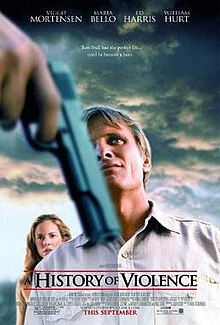
I first watched David Cronenberg's film A History of Violence a year or two after its release and I enjoyed it. After a gap of more than fifteen years, I'd forgotten much of the detail of the story, even though the central premise stuck in my mind, so I thought I'd watch it again to see whether my initial impression was confirmed or not. Suffice to say that, despite knowing the key twist, I enjoyed it all over again.
Mild-mannered Tom Stall (Viggo Mortensen, who is excellent) is living a more or less idyllic life in a small town in Indiana. He owns a small diner and is popular with local people. He is married to an extremely attractive lawyer called Edie (Maria Bello) and they have a boy and a girl. Of course they have their problems - for instance, their son is a target for bullies at school - but all in all, things couldn't be much better.
Their lives are irrevocably changed when two violent criminals arrive in town. We've already seen these men kill some innocent people for no very good reason and we fear the worst when they turn up at the diner. They are menacing towards Tom and when a woman who works in the diner tries to leave, they attack her. But Tom fights back courageously - and with unexpected verve - and the two men wind up dead.
So Tom becomes a hero and the case attracts a great deal of publicity. Unfortunately, this has extremely adverse consequences. Before long, more strangers arrive in town, and this time they are looking specifically for Tom...I don't want to say any more, but this is a strong thriller that also delves into character and considers the nature of redemption. There's also a terrific performance in the later stages of the movie from the late, great William Hurt. Recommended.
April 19, 2024
Forgotten Book - The Etruscan Net aka The Family Tomb
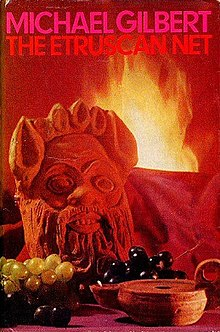
Throughout the 1960s, Michael Gilbert published only four novels - although this very industrious writer was, as ever, far from idle during that time, combining his legal career with a wide range of literary projects, including short stories and scripts. What fascinates me is the remarkable range of those four novels. So we have, in chronological order, , After the Fine Weather, a story about local government corruption in the English provinces, The Crack in the Teacup, and a story about industrial espionage and the fate of a ruthless yet charismatic entrepreneur, , And finally, The Etruscan Net, aka The Family Tomb, which dates from 1968, and which is set in Tuscany and involves the Mafia. What an extraordinarily diverse repertoire.
I've always been a big fan of Gilbert, but because he rang the changes so often, it's inevitable that I like some books more than others. The Crack in the Teacup is an old favourite, but on first reading I had some doubts about the other three books from the 60s and in fact I've only just reread The Etruscan Net after first devouring it as a schoolboy. I must admit that at that time I was a bit disappointed. There are low-key elements in Gilbert's writing which can be frustrating, in particular in the way that he sometimes wraps up a novel.
These features in this particular book explain why some people, such as the reviewer of this book for Kirkus, found it tedious, although others, such as the critic for The New York Times, were much impressed. As time has passed, I've become more sympathetic to what Gilbert was trying to achieve in books that didn't really do it for me the first time around, perhaps because I didn't know what to expect and didn't fully understand what he was trying to do.
On reading this book again, I enjoyed it more than I did originally. There are lots of typical Gilbert touches - the introduction of lawyers (including Italian lawyers), a potential criminal trial, a damaged protagonist (the gallery owner Robert Broke) and an entertaining confederacy of people who try to help Broke, who has been framed for a killing, off the hook. Gilbert knew Italy well and there are, as ever, various wartime references, some of which probably owe something to his experiences when escaping from a POW camp. Broke more or less disappears from the action in the second half of the book,because he's in prison, and there's a certain diffusion of interest as a result, which I'm bound to admit is not unusual in Gilbert's books. It's not one of his major novels, but it's still an entertaining read.
April 16, 2024
Sepulchre Street and the eDunnit award shortlist
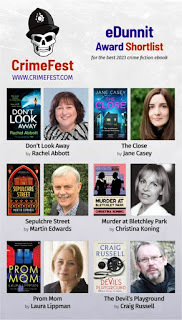
I'm truly delighted by the announcement today of the shortlist for the eDunnit award at CrimeFest this year, which as you can see from the above graphic includes Sepulchre Street, the fourth book in the Rachel Savernake series. It's thrilling to achieve a degree of recognition for one's novels, and to be in a list alongside such other fine writers, including a number of international bestsellers, is truly an honour.
The award is for the best crime fiction first published in both hard copy and electronic format in the UK in 2023. I made the shortlist once before, with Gallows Court a few years ago, although I had to miss the awards ceremony because I'd committed to giving lectures on the Queen Mary 2 (yep, it's a tough life). Otherwise, I'd have moved heaven and earth to attend, because - win or lose - I think it's rather wonderful to be present at an event when your book, something you worked so hard for so long to create, receives a degree of acclaim. And in fact I booked to take part in CrimeFest and attend the awards dinner many months ago, not imagining for a moment that I'd get on to this shortlist.
I know some writers take a different view about attending awards ceremonies, usually in circumstances where they are pessimistic about the outcome and don't want to experience the disappointment of not winning. I understand that attitude, but I've never shared it, although there have been plenty of occasions when mine hasn't been the name in the winner's envelope. I've been present on more than one occasion when the winner of an award missed out on the pleasure of enjoying their success in person and that always strikes me as a pity. It's a cliche, but it's very true all the same, that it is an honour to make a shortlist (or a longlist, if there is one) and I'm all in favour of relishing the moment and not worrying too much about the ultimate outcome. The reality is, you never know if you'll ever have another chance to celebrate featuring on a list like this.
Writing can be a very tough game - that's one of the themes of The Life of Crime - and these moments are precious and deserve to be cherished. Doing this can, I feel, be very beneficial on other occasions, when things aren't going well with the writing for whatever reason - believe me, it happens to everyone! It's great to be able to reflect on the good moments and feel encouraged and motivated to keep going as a result. And that's my approach.
So warm congratulations to the other five finalists and I must say that this great news is incredibly well-timed, coinciding as it does with my having sent off to my editor the copy-edited text of the next Rachel Savernake novel - Hemlock Bay.
April 15, 2024
Ripley - Netflix TV review

Do we really need another screen version of The Talented Mr Ripley? I have mixed views. Part of me thinks that it would be good for less well-known books to be given an airing on TV. Part of me recognises the commercial realities. Just as TV companies (and screenwriters) go for the easy option of recycling endless Agatha Christie stories because of the strength of the brand, so Patricia Highsmith is notable enough to draw viewers who might not give a less renowned author the time of day. And Tom Ripley is undoubtedly one of the great characters of twentieth century crime fiction. Anyway, for better or worse, Netflix have produced Ripley, an eight-part version of Highsmith's story, and I decided to take a look.
I was startled to realise that the entire show is shot in black and white. I wondered about that, I must admit. I was, however, reassured by the fact that the screenplay was written by Stephen Zaillian, a very accomplished writer who won an Oscar for Schindler's List; he has the ability to entertain while making serious points that keep you on your toes, and that isn't as easy as he makes it look.
Andrew Scott, cast as Ripley, was an extremely interesting choice of lead actor. Scott is older than I imagine Ripley to be, and I feared that might affect his portrayal of the sociopathic charmer. I also worried that stretching the story out into eight episodes would mean that it became boring in places. This is the recurrent failing of modern television - there's too much padding, for purely commercial reasons, and it affects the quality of shows that might otherwise have worked really well.
So my reservations were numerous, but there was enough about the show to attract my attention, and I must say I was soon hooked. Even the slow pacing worked - to my surprise! There's something mesmeric and haunting about this adaptation of Highsmith's story. I liked the film version and the BBC radio version, but this take on the tale is, in my opinion, possibly even better. One or two of the changes to the story don't work too well, but most of them do. Scott is very good indeed and the visual quality of the whole series is stunning. Zaillian deserves a lot of credit, I think, and I'm very glad I set my doubts aside. Ripley is excellent television.
April 11, 2024
Forgotten Book - Death at Hallows End
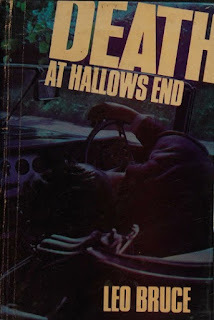
The starting point for Leo Bruce's 1965 Death at Hallows End is the mysterious disappearance of a solicitor. Duncan Humby seems to have vanished into thin air while visiting a remote village called Hallows End. There he intended to see a client called Grossiter, who wanted to change his will. In the time-honoured fashion of characters in detective novels who are about to disinherit people, Grossiter has also died, albeit apparently of natural causes.
The police have got nowhere as regards finding the missing lawyer so his partner, Thripp, asks Carolus Deene to help. When Carolus goes to Hallows End, he encounters - as usual in these novels - an entertaining range of individuals, including a pub landlord with a taste for trendy dialogue, and a chap called Stonegate who is determined to get as much publicity as he can for being the last man to see the missing solicitor. But is his evidence reliable?
Carolus believes that the best place to start making enquiries is the local pub, a nice idea, I think. There are a few interesting plot twists and in the end, Carolus explains everything as a sort of after-dinner entertainment for his headmaster, a policeman, and a few others who are connected in some way with the case. There's a slight element of anti-climax to this, but arguably it's a better way of ending a book than a contrived scene in which the hero's life is unnecessarily endangered by a decision to confront the villain without back-up.
I did feel, however, that there were some signs that Rupert Croft-Cooke (who wrote as Leo Bruce) was getting either a bit lazy or a bit bored with the Carolus Deene stories by the time he wrote this one - the fourteenth in the series. There are occasionally inelegant passages - and this from an author who could at his best be very stylish - for which one can possibly blame the proof reader or copy editor. There are also one or two devices that I recognised as reworked versions of ingredients from his earlier books. Perhaps he was in a rush to meet a deadline. Yet despite some shortcomings, this is a readable entertaining story which merits revival.



